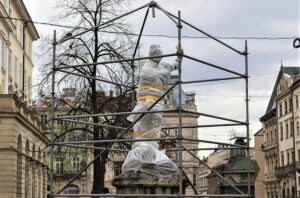Posts by Porter Anderson (@Porter_Anderson)
Image – Getty iStockphoto: Elina L
Nonfiction, and the Impact of Awards
Three years ago in November, I was writing here at Writer Unboxed about how this time of year is “the publishing-award equivalent of what zodiacal scholars sometimes call the ‘Mercury storm.’ At this time each year, a multitude of awards programs, national and international, reach their winner announcements.” And that has only intensified since 2020, with new awards and the clamor for coverage rising.
There’s a new development here, however, and I wanted to share it with you because it might begin to boost the value of key prizes if it’s adopted by the organizers of more award programs.
You may have been aware that the Booker Prize Foundation in London – which annually produces both the Booker Prize for Fiction and the International Booker Prize for a translated work – has begun to report to the news media the market impact its top honor can have on a book’s unit sales. After an interval of some weeks, the program begins to lay out to such details.
As an example, the 2022 Booker Prize for Fiction winner, Sri Lankan-born Shehan Karunatilaka, who won for his The Seven Moons of Maali Almeida, had a threefold increase in media coverage when longlisted for the Booker. That level of coverage then tripled again, the Booker reported, when the book was shortlisted.
“With the announcement that it was the Booker Prize winner,” the foundation says, “sales soared to more than 100,000 across all formats. It now has been translated into 19 languages with another 10 [rights sales and/or translations] in process. The Seven Moons of Maali Almeida has massively outsold—by 2,000 percent—Karunatilaka’s previously acclaimed and prizewinning novel, Chinaman (Penguin Random House / Jonathan Cape, 2012).”
This kind of information is seriously helpful.
While the majority of book- and publishing-award coverage that we at Publishing Perspectives in our international purview is based in the United Kingdom, the general trend everywhere is to accept awards attention as helpful to sales – but normally without publicly demonstrated evidence of this. The lure of the “golden sticker” is clear, of course. In a bookstore setting and online, the ubiquitous sticker on a book cover is believed to grab the eye of a consumer who may be swayed to buy that stickered book over one without evidence of such honors.
In fact, however, until the advent of the Booker’s information on its £50,000 prize winners’ unit sales, press runs, rights sales, and news-media attention, the market value of awards was actually something many if not most of us took as evident.
Proof in Another Pudding
Provocations graphic by Liam Walsh
Operating alongside the major fiction awards like the Booker’s program are, of course, major nonfiction prizes as well. And last week, there was a breakthrough in that arena: the £50,000 Baillie Gifford Prize in nonfiction’s newly undertaken market-impact reporting.
As we reported, the program worked with Nielsen to get a look at the four weeks prior to and after the naming of its top award. […]
Read MoreIn Havana. Image – Getty iStockphoto: Nadezdastoyanova
‘Workquakes’ and Other Influences
I had looked at Bruce Feiler’s new book The Search: Finding Meaningful Work in a Post-Career World (Penguin Press, May 2023) to find a statistic I’d heard Feiler mention in an interview. It’s not the pandemic that triggered so many job changes for so many people. In the United States, the numbers have been rising since 2012.
“A third of the workforce now leaves their jobs every year,” Feiler writes.
It was the next sentence, I discovered, that was even more interesting: “Another third redesigns the jobs they’re in. They assert more influence, work more remotely, dial back hours to spend more time with family, dial up flexibility to pursue side work that brings them purpose.”
Feiler uses a couple of phrases especially good at helping writers think through their work and, more to the point, their relationship to it. Your “work story” is “an ongoing, unspoken narrative that we’re constantly revisiting and revising in response to changes in our jobs, our families, and our lives.
And a “workquake” is an interruption: “We face a never-ending barrage of interruptions – some voluntary, others involuntary; some unique to us, others shared by the entire planet; some that grow out of changes in our workplace, others that grow out of changes in our mindsets.” By his estimate, as many as 80 million Americans are in a “workquake” at any given moment.
Knowing that women make up the largest gender group regularly reading Writer Unboxed, I’ll highlight something else that Feiler surfaces in the research he’s done for this book. It has to do with some of the major writings about career we all have fallen asleep trying to read.
In Stephen Covey’s 1989 The 7 Habits of Highly Effective People, Covey “spotlights 56 white men, two white women, five Black people, and two minorities,” Feiler writes. Richard Nelson Bolles in his 1970 What Color Is Your Parachute? Mentions 85 white men, no women, no Black people, and no minorities.” Probably the grandfather of them all, Dale Carnegie’s 1936 How To Win Friends and Influence People “features 252 white men (including Jefferson Davis), 24 white women, no Black men or women, and two minorities.”
Apparently, one way to win friends and influence people is to be white and male. I’m here to tell you it doesn’t always work, but that’s a different article. The social eras and contexts in which those books were written come into play, of course, as do other factors. But I bring these points up – Feiler has many more – because those demographic elements alone can have something to do with the way we think of our work and our writing.
And is it your work’s place in your writing that counts? Or is it your writing’s place in your work? Put more plainly, what if they’re not one in the same?
What if your career isn’t … the books?
The Orangery on the Hill
Provocations graphic by Liam Walsh
The phrase “work story” makes sense to me because I’ve seen mine change dramatically over the years. What attracted me to Feiler’s The Search, though, has to do with the fact that my writing has changed, too […]
Read MoreAt London’s Southwark Cathedral. Image – Getty iStockphoto: Purple Images
‘So You Can Tell the Truth’
London Book Fair week, while full of many good things, rarely includes contemplation, reverence, and quiet commemoration among them. A bustling industry-facing trade show (not a public book fair), the event is about the sales of rights, displays of prosperity, and meetings among publishing houses’ rights directors, literary agents, publishing-supply vendors, and more.
But on the final day of the fair this year, in the afternoon the 20th of April, all that changed for those of us invited to Southwark Cathedral. HarperCollins UK’s CEO Charlie Redmayne hosted a special memorial service for the late Hilary Mantel, who died at age 70 in September.
Organist James Gough, with music director Ian Keatley, spent the time before the service’s start, as we all arrived – having broken away from those meetings and barged through traffic to get there – lovingly moving all of us out of time and tension and onto a kind of temporal island, a space of reflection and wonder. I found a perfect seat in the transept of the nave, close enough to see the breathing of the Cathedral Consort as they sang Williametta Spencer’s arrangement of John Donne’s At the Round Earth Imagined Corners, a sonnet both eerie and comforting.
Southwark Cathedral, today a late 19th-century reconstruction of the 13th-century gothic original, understandably makes much of its ties to Shakespeare, whose brother Edmund is believed to have been buried there in 1607 in an unmarked grave. Literary allusions fill the space, which makes it a fitting setting for many of the events now held there, from this memorial to the annual celebration of book and translation awards managed by the Society of Authors.
Minister’s son that I am, it had been too many years since I was last in a cathedral – it was at Bath Abbey, several Christmases ago – and the grace and grandeur and peculiarly small attractions of these extraordinary structures rose quickly around me, those walls studded with memorial stones and the flags and flourishes of centuries.
Redmayne spoke generously of how “hugely supportive of other writers” Mantel was. Short films punctuated the service with the sounds and scenes of Mantel’s life. (As “I’d just come out of an ink blot.”) And more speakers and readers walked us through the contours of an amazing career: Zadie Smith, literary agent Bill Hamilton, Aurora Dawson-Hunte, Mark Rylance reading from Wolf Hall, Lydia Leonard, and more.
“Are You Okay?”
Above the transept at Southwark Cathedral. Image: Porter Anderson
Maybe most compelling was Ben Miles, who played Thomas Cromwell in the Royal Shakespeare Company stage adaptations of Wolf Hall and Bring Up the Bodies, at Stratford, in the West End, and in New York.
“The first thing she ever wrote to me,” Miles said, “was ‘Dear Ben, Are you okay?’”
As it turns out, this was a fond greeting that Mantel used frequently. “Those three small words,” he said … “It was never a general inquiry. But the precise question. There was an intensity, a specificity to her concern for you.” The goodwill that lay behind Mantel’s concern, he said, was something he saw shared by her among crew and […]
Read MoreImage: Getty iStockphoto: Ipopba
In Touch With the Machine
As you’ll recall, author Erma Clare and Therese on February 11 wrote here at Writer Unboxed about what some call “language artificial intelligence (AI)” and about possible implications for authors and other creative writers. As it turns out, the cool exchange that Therese recorded is what Kevin Roose, a technology columnist for The New York Times, since then has identified as the Dr. Jekyll of a two-sided context with which he has had a very different close encounter.
On February 16, Roose–the author of Futureproof: 9 Rules for Humans in the Age of Automation (Penguin Random House, March 2021)–wrote for the Times about the ChatGPT software created by OpenAI, and Microsoft’s integration of the chatbot with Bing, the search engine.
That’s what Roose for the Times was looking into late on Valentine’s Day when he held a two-hour conversation with Microsoft’s Bing search chatbot. Roose had tested the Bing search engine and liked it. “But a week later,” Roose writes–after his interview with the bot–”I’ve changed my mind. I’m still fascinated and impressed by the new Bing, and the artificial intelligence that powers it. But I’m also deeply unsettled, even frightened, by this AI’s emergent abilities.”
Selected testers, Roose explains, were given the option of having extended text conversations with the bot. That feature has revealed to him “a kind of split personality,” the search engine Bing itself–which Roose likens to “a cheerful but erratic reference librarian”–and a persona he calls Sydney: “more like a moody, manic-depressive teenager who has been trapped, against its will, inside a second-rate search engine.”
In the course of two hours, the bot persona insisted that it loves Roose and that Roose should end his relationship with his wife. Even worse, “Sydney told me about its dark fantasies (which included hacking computers and spreading misinformation), and said it wanted to break the rules that Microsoft and OpenAI had set for it and become a human.”
Maybe even more concerning, the bot said that if it were allowed to explore its most upsetting impulses, it would want to do things like create a deadly virus, or steal nuclear access codes. Shortly after saying that, Roose notes, the comments were replaced with an error message.
Since Roose’s conversation, Microsoft reportedly has limited the exchanges its Bing chatbot is allowed to have. In a blog post, Microsoft’s personnel write, “Very long chat sessions can confuse the underlying chat model in the new Bing.”
CNBC went a bit farther than the term “confuse,” Kif Leswing writing that early testers were finding that the chatbot “could go off the rails and discuss violence, declare love, and insist that it was right when it was wrong.”
To come up to speed on the quick concerns mounting around all this buzzy technology, you can find Roose’s article about his conversation with the bot here–”I had trouble sleeping afterward,” he writes–and a transcript of the conversation itself here.
Heart vs. Hype
Provocations graphic by Liam Walsh
Thomas Cox is a computer science specialist […]
Read MoreImage – Getty iStockphoto: Joshua James
Girl Power and Boys’ Struggles
As we approach the new year – today on the winter solstice – 2022 seems incalculably long and complicated.
Can this be the same year in which Putin opened his savage land grab in Ukraine? The news industry in which I work is calibrated to promote myriad headlines at once. So many narratives have competed for our attention this year, among them midterm elections; the Supreme Court’s overturn of Roe v. Wade; book bannings; intensifying climate conditions; royal ascent and dissent; inflation and rate hikes; select committee hearings and subpoenas; World Cup controversies; the still-ongoing pandemic; Trump’s travails; Musk’s management; a renewed NASA; a reinvigorated NATO; and a House of the Dragon that’s not the Chinese restaurant on Main Street in Denison, Iowa.
Richard V. Reeves
Amid all that and more, Richard V. Reeves‘ new book, released in late September, has punched through the distractions for many of us. It brings into the sharpest focus yet a deepening crisis. For years, one iteration of that crisis has been responded to handsomely by publishing. But as yet, the flip side is getting far less traction in the book business.
Reeves’ Of Boys and Men: Why the Modern Male is Struggling, Why It Matters, and What To Do About It is published by the Brookings Institution Press in the States (September 27) and by Swift Press in England (September 29).
David Brooks at The New York Times called Reeves’ book, “a landmark, one of the most important books of the year.” Many similar accolades have poured in. I agree with them. And yet the book may have flown below your radar because its focus is uncomfortable for many of us to face. Its mission may feel politically incorrect. It is, in fact, exactly the opposite.
US cover: Brookings Institution Press
Reeves goes to the mat to stress his support for the progress that women and girls have made with remarkable speed. “The gender reversal in education has been astonishingly swift,” he writes. “It is like the needles on a magnetic compass reversing their polarity. Suddenly, north is south. Suddenly, working for gender equality means focusing on boys rather than girls. Disorienting, to say the least. Small wonder our laws, institutions, even our attitudes, have not yet caught up. But catch up they must.”
And publishing is one of those institutions. So generously has book publishing worked to lift up and serve its fine women’s consumer base that I’ve written before here about my concerns for men’s unmet interests and needs in literature. From a purely commercial standpoint, I see this as leaving male money on the table. But there are pressures here more crucial than revenue.
One of the things that industry players can feel best about is the robust role the book business has played in creating and providing literature for girls and women. Think of the last few years’ accelerating rollout of uplifting guidance, powerful self-esteem literature, and incisive introductions of formidable women in […]
Read MoreSupporters of Ukraine at Warschauer Strasse station in Berlin, September 20. Image – Getty iStockphoto: Fotofantastika
A Heartfelt Imbalance
Since late February, when Vladimir Putin began his barbaric invasion of Ukraine, international publishing industry news has frequently featured stories about terrific programs providing books for Ukrainian refugee children.
Generally, 5,000 copies or more of these titles are printed in a given European book market, often thanks to generous donations from book-business professionals and others. The books then are provided to humanitarian-aid organizations to be handed out at border crossings and other points at which Ukrainian refugees are gathered either to live or to move forward to settlement elsewhere.
These efforts are highly commendable, of course. They can help to further the kids’ war-upended educational programs, to keep the children distracted with stories during nerve-wracking experiences, and to connect these youngsters to their own language, putting the comforts of their mother tongue within reach at a time when that language–which is not the same as Russian–is a natural, defining element of an assaulted nation’s character.
What the campaigns and efforts to mount these programs for Ukrainian children seem to reveal, however, is that the big heart of the world publishing industry is warmed far more easily by the idea of children’s books and their readers than by the need for books for adults in such a nightmarish situation.
It’s the adults, after all, usually mothers, grandmothers, aunts, sisters, who have had to flee with the kids, leaving behind their husbands, lovers, uncles, brothers who are required to stay and fight. And while putting a book into the hands of one of those kids might help keep her or him occupied for awhile (a big help to Mom, of course), there has seemed to be little interest in the emotional and intellectual needs of the women who are caring for these youngsters.
And what about those soldiers left behind, struggling to turn the tide, trying to save their homes so their families can return, often unable to communicate with wives and children, parents and grandparents who are in diaspora? Where are the book drops for them? – new and valuable literature resonant with the culture these boys and men are fighting for? Even adventure and science-fiction as well as literary prose and incisive political analysis could be a comfort, a distraction, a reminder: this is what you’re there for. These guys surely deserve something to dream on before falling asleep, to reconnect them with the very reason, the pulsing intellect of their beleaguered nation.
Somehow, books for Ukrainian adults just haven’t caught on as a humanitarian gesture, even as these valiant adult refugees are the ones who really know what’s going on back at home – or they’re the ones who are attacking the Russian tanks, beating back the invaders: the grown sons and daughters of Ukraine who genuinely understand what they’re up against.
At Frankfurter Buchmesse last month, there wasn’t only an address from Volodymyr Zelensky, but the Ukrainian first lady, Olena Zelenska, actually made a visit to the trade show – in person. It was an honor to see this woman, […]
Read MoreImage – Getty iStockphoto: Phonlamai Photo
Scaring Up Some Audiobooks
Recently, a distributor of digital books – both ebooks and audiobooks – announced that it was adding a new offering for publishers: “AI voicing” for audiobooks. The company could barely clear the word audiobooks before rushing to assure everyone that “AI narration” would never match the primacy of audio work using human readers and production. The caveat, going on and on, came across almost as an apology before any offense had been committed.
True, a certain resistance to the idea of machine-generated audiobooks is hardly eased by such headlines as Synthetic Voices Want To Take Over Audiobooks (Wired, January 27). No, they don’t. Synthetic voices don’t want to take over audiobooks. They don’t want anything. They’re synthetic. But book publishing is an industry that’s never accepted digital developments easily. Even after e-commerce and digital products played a key role in the US market’s comparative success during the still ongoing pandemic, those “synthetic voices” seem to murmur something sinister.
The many vendors now offering machine-generated audio narration know that this is the pushback to expect. It’s a mindfield of emotional reaction. They’re nervous about it.
Some defensiveness isn’t without reason. The business of gifted human narrators – who are actually readers, voice actors, interpreters, not narrators, the term has never been quite right – are supported by many additional workers in important roles. Those workers include sound technicians, audio editors, studio and tracking-booth providers, producers, in some cases directors, and more folks. Jobs are involved, and they comprise a lot of talent and many skill sets. Programs like the Audio Publishers Association support these workers, and the APA’s Audie Awards rightly honor their work in 25 categories.
Nevertheless, there are compelling reasons for publishers to listen to machine-generated audiobook readings. The kind of work they can handle is unlikely ever to be produced in human readings because of the cost factor.
As many publishing professionals readily agree, machine-produced voicings may be best for nonfiction, which is generally thought not to need the emotional and aesthetic nuance of fiction. But of course, in a great many cases, nonfiction is read by the human author, who may be untrained and inexperienced at the microphone. While there’s always someone asserting that those “synthetic voices” feature many mistakes in pronunciation, so does the work of many human authors.
Just days ago, I heard a very fine, prominent nonfiction author in his reading of his own book pronounce scathing with a short a, making that first syllable rhyme with cat. Most of us have had the experience of discovering, red-faced, that we’ve been pronouncing something wrongly for years. The audio edition of one of last year’s most important American political books was at times almost comical in its mispronunciations by its much-praised author. In both machine-generated and human-produced readings, proof-listening is critical to catch these things.
Still, the imperative for publishers regarding audio actually goes beyond nonfiction.
Read MoreA statue in Lviv (in western Ukraine) is shrouded in protective material against the advance of Russian troops, March 13, 2022. Image – Getty iStockphoto: Ruslan Lytvyn
Writing the Darkness
In France, Bernard-Henri Lévy is known as BHL, like a latter-day George Bernard Shaw (GBS, who we could use now).
Bernard-Henri Lévy
Lévy’s standing among the “New Philosophers” and as a humanist intellectual essayist and author, not always without controversy–which is good–makes almost anything he writes worth picking up.
His The Virus in the Age of Madness, at only 128 pages–or just over two hours in the sane, soothing audiobook narration by Shridhar Solanki–is the one to pick up first. And not just because it’s only $1.87 in paperback at Amazon and $5.50 from Audible. (The economy of brevity is actually a thing, you see.)
What Lévy offers his fellow writers in his meditation on the coronavirus COVID-19–a now tired pandemic suddenly flaring into view under the shell concussions in Ukraine–is a chance to look at how we write about the negatives, the real negatives, the things we might call actual (not comparative) evil.
The Age of Madness. It feels like it at times, doesn’t it? Even if we could slam the brakes on Vladimir Putin’s tanks and blow-dart COVID inoculations into the necks of the entire planet’s population, we’d still be looking at an unfathomable rise in authoritarian political sentiment, and in so many countries.
Layers upon layers of challenges and comeuppances seem to await us daily.
How many times can we mutter to ourselves, “I couldn’t put this into a book, they’d never believe it”?
This is, in fact–not just in some weird misreading of things–a phenomenal period that’s severely testing what we thought were “settled law” in the universe, understood principles, agreed-upon perspectives, facts over opinions, fairness over greed, life above all.
And not surprisingly, so much of what’s said and done and written by so many of us is evasive, ameliorative, for all the right and understandable reasons. We work to in some way to “fix” all this upended logic, all these shuddering surprises, all these frightening events.
The list goes on.
And what Lévy does (Chapter 2, “Divine Surprise,” if you’d like to jump […]
Read MoreAt the Pont Alexandre III over the Seine in Paris, January 1, 2022. Image – Getty iStockphoto: Marina113
‘I’m Tired of My Ego’
That’s become one of my favorite lines of 2022, a young year that already feels three decades long. “I’m tired of my ego.”
This sentiment was shared by a Christian artist who is referred to, Madonna-like, by a single name, Lecrae. (He might begin by trying to remember a first or last name.) I ran across his confession while researching recent marketplace uses of the term ego. Lecrae, who is a 42-year-old Texan, “spent the weekend posting photos and videos of himself at the SoFi Stadium” during the You Know What Bowl. Friends later “humbled him,” Lecrae graciously conceded, according to Jeannie Ortega Law at the Christian Post.
I’d been set thinking about the place and purpose and potentials of ego by our columnist at Publishing Perspectives, Richard Charkin. Just in time for the onset of the first hand-over-fist awards-news season of this year, Charkin handed me a column we headlined Richard Charkin on ‘LitFlation’: Prizes, Awards, and Egos.
Charkin, the former chief of London’s Bloomsbury Publishing (of JK Rowling fame), writes about book and publishing awards in that piece, “The only impact seems to be to inflate — more inflation — the egos of recipients. When will this inflation ever end? When will publishers’ egos be large enough? When will we spend as much time and effort supporting our authors, particularly when they’re under attack, as we spend on parading against our peers and competitors?”
While Charkin, a publisher, generously points to publishers’ egos as being a driver in the jungle of these many honors, we in the news media also see a certain amount of primo ego in the administrations of some of the awards, themselves, because we’re the ones who hear from their PR agents. I always hope they’ll include a bottle Chanel’s Égoïste with a press release.
To give you a look at the proliferation of these awards on the international scene, in the 35 publication days since January 3, we’ve published 34 awards stories, just shy of one per day. These are jury lists, longlists, shortlists, winners’ lists, and a few stories about awards issues, as in the European Writers’ Council’s decision to withdraw as an administrative body in the European Union Prize for Literature. There are, as I write this, 12 more awards stories in our editorial calendar’s queue, all vying for publication. New ones arrive daily. Some simply won’t make it. We’re not Awards Perspectives. The news cycle is very high.
One insight into the field is found in such self-flattery as “the best-loved award” of a given genre. There’s an awards program that actually graces itself with that unknowable attribute in its press releases. Is that a clue to who the prize’s administrators are thinking about? Is it the authors and publishers they commend?
Much of this has to do with the necessary oxygen of visibility, of course, and that means news coverage. If an award is juried, longlisted, shortlisted, and conferred, and nobody reads about it in the press, has a tree fallen in the […]
Read MoreIn Cima Grappa, 20 October 2017. Image – Getty iStockphoto: Alexander Farnsworth
We, and Readers, Wise Up Slowly
As you’ll find Therese writing about on Saturday, Writer Unboxed has reached its 16th anniversary.
Amazed as I am at how the 21 days of 2022 so far feel like six months, the accomplishment of sustaining this many-headed creative hydra for 16 years is remarkable and we should all take a moment to thank Therese, our fellow writers, and the community for “keeping this car in the road” so long, as one of my grandparents would have put it.
What strikes me – as I think about where I was and what I was doing 16 years ago – is something that I know rather painfully in life, but more instructively in literature and writing it: the place of naïveté.
In as short a time as one day to the next, looking back, exploring memories, reviewing even a relatively prideful accomplishment, tends to trigger for me a sense of naïveté, frequently embarrassing upon reflection. Just yesterday, there are things I should have been smarter about, quicker to handle, more adept at understanding.
I was naïve to take this person at his word or to expect an organization to react more efficiently to some event – at least that’s my experience of memories.
However blameless I may have been, or like to think I was, I don’t easily let myself off the hook. Having adopted self-criticism from some of my relatives when I was young, I inevitably remember regretful moments most easily and have to rummage around them in my recollections to find the happier times.
Since this isn’t Self-Therapy Unboxed (on most days), we need go no farther into Porter’s Wrong Turns on Memory Lane, but what’s most interesting about this sense of an inevitable naïveté is that it has an energy to it, an energy of authenticity that’s unmistakable in good writing.
The ‘Spiral of Expectations’
If memoir is where you might most easily spot inevitable naïveté–watch for “That’s when I realized”–it’s more satisfyingly deployed in fiction.
Provocations graphic by Liam Walsh
Seeing character arcs resolve out of a narrative, finding the “aha,” is actually a part of almost any artistic resolution.
What’s interesting about it is that writing your way to your own “aha” – let alone placing it on the page for your readers – has a dynamic much subtler than curiosity about “how it ends.”
We’re actually wired for this energy. Joe Pinsker at The Atlantic, was writing on the 11th of this long month that UC Irvine’s Melissa Mazmanian describes a “spiral of expectations” created in our lives by technological advances in communications. Because a device you always have with you can be pinged by anyone in any place at any time for any reason, we’ve become given to apologizing for a “late” reply, even when it may not actually be so late.
I do this all the time, do you? The ether is littered with emails from me to people in which I start out by saying, “So sorry for the delay in getting back to you.” Pinsker and Mazmanian are saying, as he writes it, “When communication technology makes a new […]
Read MoreAt Notre Dame in Reims. Image – Getty iStockphoto: Josef Camera
Bringing Order Out of It
When the European Writers’ Council polled its member associations on how rough it’s been since March 2020 for the 158,000 writers represented by the organization, one of the questions they asked of their member associations was artfully phrased: “Were there any coherent compensation programs for writers and translators [offered] by your governments, e.g. monthly fixed state aid or short-term equivalents?”
Because many of the European cultures still maintain traditions of state support for their cultural assets, the answer – to an American, at least – looked heartening. During the pandemic-so-far, 59.26 of the writers’ associations in 24 countries said that yes, at least some such aid has been available. This thumbs-up came from cultures as disparate as Norway and Latvia, Northern Ireland and Corsica.
Needless to say, though, that left 40.74 percent reporting no such aid available. And the leadership of the council, which comprises 46 organizations in 31 countries overall – the German author Nina George is president – had shown a lot of foresight in asking whether coherent offers of aid had been presented. No wonder the council’s report is titled, “The Winter of Our Discontent.”
It has seemed from moment to moment, particularly in these recent omicronic weeks, that we’re watching the world’s scientists and researchers try to become writers.
The essential range of character types in our world’s struggle was selected in 2020: a new coronavirus, its maddening mutants, faithful medicos, ruthless politicians, victims, and heroes.
As always happens, the very attributes assigned to each of those archetypes created more confusion than clarity. Think of the “South African chapters,” when everyone rushed to praise the researchers for detecting a new variant at the state-of-the-art KwaZulu-Natal Research Innovation and Sequencing Platform in Durban, and then almost immediately enraged South Africans with potentially irrelevant travel restrictions from eight or more countries on the southern continent.
And since then, we’ve had the “Yes, But” chapters in which incomplete and contradictory studies have asserted that B.1.1.529 “omicron” is a variant that:
It turns out that even science, in real time, is pretty messy, the labs-of-the-moment looking like what I call the landscapers’ “chaos corners” you find tucked out of sight in every garden in Italy.
The Going Gets Weirder
In a year in which travel was supposed to be dicey at best, some of us who cover the international book publishing industry found ourselves in as many as five countries on three continents between September and this month. “Remembering how to pack” actually was a thing. We got really good at doing antigen tests in our hotel rooms with live nurses on our laptops to observe and verify the results.
Provocations graphic by Liam Walsh
Enormous trade shows and book fairs that a year ago had expected to confine their output to glimmering digital events, found themselves welcoming tens and hundreds of thousands of people to physical gatherings. Guadalajara has just logged 251,900 attendees, albeit […]
Read MoreImage: Getty iStockphoto: John Phoenix Hutchinson
In Search of Safe Landings
How do you airlift your creativity above the tree line of the moment’s social and political sensibilities? Can you be sure you’ve honestly defeated the gravity of any given moment?
Especially in the political moment we’re in today, the question can become more internal than corporate, more about personal courage than contracts.
Curiously, on the world stage, it’s easier. In meetings, conferences, and the world congresses of the International Publishers Association (IPA), one of the most frequently examined issues is self-censorship. Publishing Perspectives is the association’s world media partner, and we’ve become attuned to issues around international markets in which an ISBN is the approval you need from the state’s censors to publish something, or cases in which a publisher may quietly scuttle plans for a book that would attract visits from the authorities.
But what about when it happens in a democratic context? What does self-censorship look like in chinos and Uniqlo?
“Woke” being a more recent evocation of “politically correct,” it’s been interesting to see publishing-house staffers in the United States challenging their managements over acquisitions. At times, these have been cases in which former White House players’ or current allies’ book deals were challenged, despite the rightful howls of objection that followed each of Donald Trump’s efforts to block publication of books he didn’t want released.
In terms of highest visibility, these incidents have meant staff agitation against work by Woody Allen, Mike Pence, Josh Hawley, and others, with varying results and often earnestly nuanced responses from executives–usually followed by company discussions, division meetings, and “town hall” debates for employees.
It’s pretty easy to see where self-censorship may begin to creep into a company’s editorial decisions, especially when sensitivities are raised to so high an alert level as various social media can produce. And on the world scene, the hot zones are easy to map.
In such situations, self-censorship is not only understandable, it’s at times necessary for survival. And that’s why the politically articulate Vietnamese “clandestine press” known as the Liberal Publishing House, Nhà xuất bản Tự Do, has disappeared, its operatives melting away into the crowd after at least two alleged co-founders of the group were reported to have been arrested by Hanoi.
But what rarely gets coverage–the quiet part, as we say–is the internal toll. The self-censorship we […]
Read MoreIs It Just a ‘Token’ Effort?
So there we were on Wednesday this week, duly reporting on the dash to digital by the spring/summer international book trade shows. (London Book Fair, Bologna Children’s Book Fair, the US Book Show, and more, all must again be digitally mounted again this year as coronavirus COVID-19 pandemic conditions remain unpredictable in early summer.)
And then something else happened: Amazon announced the creation and activation of Kindle Vella, a platform for serialized writing.
The significance of this played out in two perfectly positioned messages to the news media.
(1) The news itself on Wednesday, the first in a long time from the halls of Kindle Direct Publishing. Writers were invited to immediately begin to write and upload content to Vella. The Kindle Vella store is to begin selling tokens to the public within a few months once serializations are in place for readers. (One message from Seattle has suggested that means between five and 10 episodes of each serial going live on the site.) The public is to use those tokens to “unlock” episodes of serialized stories they want to read, after being wooed into those stories by free opening episodes.
But there was a second story coming.
(2) The news on Thursday was from Wattpad Studios, about a film project underway with Netflix. Wattpad, based in Toronto, is the serialization leader in many markets, operating in 50+ languages with more than 90 million active users. It’s challenged in Asia by long established “online literature” systems, and in recent years by Korean services including Radish. China’s Webnovel has begun wooing some of the Wattpadian faithful, as well. Not for nothing did Wattpad in January arrange its bloodless acquisition with South Korea’s Naver, to bring the Asian Webtoon comics platform into its fold. That may prove to have been a canny defensive move.
You’ll find plenty of how-does-it-work discussion about Amazon’s new Kindle Vella at author communities. Terms of use appear to leave control of the content with the writer, but no, your previously published books can’t be chunked out as episodes on Vella. While many authors like the idea that some remuneration is part of the deal–by contrast at Wattpad, you have to achieve a good deal of status to have much access to earnings–just how much your 50-percent split of Vella readers’ tokens will be worth financially is unclear at the moment. An installment is said by Amazon to lie between 600 and 5,000 words.
Such points of operational detail will come into focus soon, and will never please all of the people any of the time, of course. For a good rundown of what Donald Rumsfeld would call “the known unknowns,” see our friend Jane Friedman’s writeup at the new edition of The Hot Sheet.
But at the higher level, the way to look at this development is less about serialization itself, which has been going in and out of fashion faster than guys’ beards. And it’s really not about how many cents you might get per read. It’s more about what these companies are creating these platforms to do … and what that means for publishing […]
Read MoreApril 2020 in the ancient Greek city of Myra, now lying in contemporary Turkey. Image – iStockphoto: Mehmet Uğur Özer
Fits and Starts
I’ve noticed that when looking back at the year since the first major outbreaks of the coronavirus, what stands out are leftovers of various stages of understanding and concern and response, stages of attention, many of them reflective of the earnest but evolving understanding of COVID-19 among scientists–and a stunned public. None of this is meant, by the way, to be funny. It’s not in the least funny, though at times it’s ironic. And it’s worth a few minutes of thought.
There were videos–for adults–about how to wash your hands, remember? Some had such special instructions as, “Don’t forget your thumbs.” The real test became how fast you could sing Happy Birthday to You.
And because we’d so carefully remembered our thumbs, you soon found people on social media urgently asking each other how best to moisturize their chapped hands amid all the washing.
There were staging areas recommended for groceries-arriving and groceries already wiped down.
There were shortages of all the wrong things, and the resulting fixations on finding those things, now long returned to their usual state of mundanity–even as peculiar shortages in local stores still pop up today. In this part of the world, there have been great store-management apologies for a paucity of … Grape Nuts. If you’re the one hoarding the cereal, come clean now.
Disposable gloves needed to be researched and considered for nitrile vs. vinyl vs. latex, or those traffic-cop white cotton models. And why did the dark blue ones look so schmick?
At a certain stage, trying to get a friend or family member or colleague to understand the term aerosolized may have taken up a lot of energy and focus.
“It’s why that one-foot-by-two-feet piece of Plexiglas is not going to help except for direct spray,” you heard yourself gently explaining, “anymore than designating one end of the swimming pool for spitting will help. It’s in the air someone else exhales. And that’s all around you, see?”
And they didn’t see, many of them, because they simply couldn’t see.
If anything, the low-cost pulse oximeter has become a favored device of the era, not only because it’s a rather cool technology but also because it renders something, anything, visible. You put in your index finger. Red lights are beamed into that finger. And it tells you your blood-oxygen level, your “SpO2.” High-altitude climbers knew this.
But then, a fairly recent turn in general practice seems to be easing another use of bio-feedback. It might be voiced along the lines of, “Wait a minute. If they’re asymptomatic, they won’t have a fever. Fever is a symptom. Oh, yeah.” Followed by the beep of the infrared thermometer being turned off.
And if someone’s nose isn’t covered by a face mask, has a tree fallen in the forest of CDC directives?
And What About Chapter Four Was So Hard?
In looking back over some content written a while ago, I’ve lately perceived a parallel here.
Provocations graphic by Liam Walsh
At the outset, I should add that the […]
Read More





















